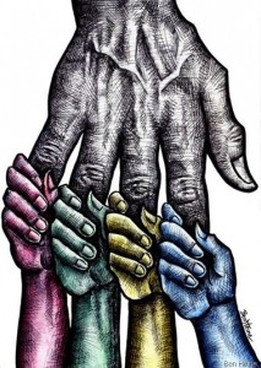 Editor’s Note: In part one of this series, Dan Oudshoorn suggested the ease with which Christian communities become flawed, self-congratulatory groups that still look like the middle-class status quo. In this part of the series, Dan challenges the shallow (at best) and colonial (at worst) attempts to relocate into the “bad part of town.” Any talk of Christian community must give priority to the question of what it means to move into more intimate forms of community with people who are marginalized, oppressed, and abandoned. This is not to say that every Christian community must be open to all these people—for example, in our community in Vancouver’s downtown eastside, we quickly realized that we couldn’t focus upon being a safe place for both the low-track female sex workers we met, and for a good many of the homeless men from the neighborhood—but prioritizing one population amongst those who have been abandoned is absolutely essential to developing intentional Christian communities. If, that is, these communities are to be more than self-serving entities that fill the void we have discovered in our own middle-class lives. Because the truth is that it is incredibly easy to establish a community that others will consider ‘radical’ and ‘inspiring’ but that, in actuality, does little or nothing for anybody apart from making those who live in that community feel good about themselves. I know this, because I experienced this. Granted, it wasn’t my intention to do so, but when I was living in Vancouver’s downtown eastside, I was constantly confronted by how easy it was to move into a poor neighborhood, engage in a few acts of hospitality (hosting sex workers for dinner, having strung-out kids stop by to come down from bad trips, allowing some people to crash on our couch) but, all in all, continue to live a life of distinctive privilege and near total insignificance . . . while simultaneously being treated as though I was some sort of Christian superstar. It would have been easy to buy into the hype I was receiving from others—and I know some who live in intentional community settings who have done this—so beware of the respect others will give you. At the very least, it’s a double-edged sword. Recall the ending of the movie, The Devil’s Advocate. If the devil doesn’t get us to serve his purposes through money, sex and power, he’ll get us to serve his purposes by congratulating us on how holy and good we are. Whoever comes to me and does not hate father and mother, wife and children, brothers and sisters, yes, and even life itself, cannot be my disciple. Whoever does not carry the cross and follow me cannot be my disciple. For which of you, intending to build a tower, does not first sit down and estimate the cost, to see whether he has enough to complete it? Otherwise, when he has laid a foundation and is not able to finish, all who see it will begin to ridicule him, saying, “This fellow began to build and was not able to finish.” … So therefore, none of you can become my disciple if you do not give up all your possessions. The best test of the praise of others, is honestly confronting the degree to which we have moved into a mutually liberating solidarity with people who have been marginalized, oppressed, and abandoned. This, first and foremost, is what it means to follow Jesus and bear witness to the in-breaking of God’s new creation in our present moment. Practicing this—what some have called a “preferential option for the poor”—is at the heart of Jesus’ ministry, just as it is at the heart of the witness of Paul, the call of the Old Testament prophets, and the Deuteronomic law. If the people of God are living outside of relationships with “the poor” then the people of God are living in a (literally) nonsensical way, and contradicting their true identity in Christ. Therefore, if we are exploring what it means to live within intentional communities that are also Christian communities, the poor must be included and prioritized. Of course, this movement into a mutually liberating solidarity with people who have been abandoned is not an easy thing for many of us to do. We are all too accustomed to our lives of privilege and comfort, our imaginations and habits have been disciplined in a certain direction ever since we were young, and our spiritual and cultural traditions make it oh-so-easy to rationalize our lifestyles and justify trite and superficial forms of charity. No wonder Jesus says that the way is broad that leads to the destruction of ourselves and of others. It is broad and it is not only lined with bloodstained electronics, food, clothing and children’s toys, it is also lined with such admirable things as a responsible work ethic, family values, safety and security, and the emphasis laid upon being a contributing member of the economy. No wonder, then, that the way that leads to life, for us and for others, is narrow and hard. Jesus is absolutely clear about this. Thus, in Luke 14.25-33, he states: Following Jesus is a demanding task and it is one of the reasons that community is so essential to our life as Christians. It is impossible to follow Jesus on our own. It is impossible to move into relationships of mutually liberating solidarity with people who have been abandoned, if you do so on your on. You will burn out or blow up. Again, I know this because I have experienced this. When things started going wrong in our community in Vancouver’s downtown eastside and people started dropping out of participating in the work required to run the community, I decided to just take on more and more of that work myself. That was unsustainable and my marriage still suffers from the consequences of that decision. Therefore, while I am operating with the happy assumption that the people gathered here are eager to participate in God’s ongoing new creation activity in the world, I do want to issue a warning that such participation is extremely difficult and demanding. As Jesus suggests in Luke 14, you had better seriously consider the cost of what you are thinking about doing, otherwise you may just end up hurting a lot of people by pursuing this dream. Often it is our failed efforts to love others that end up being far more hurtful to them than anything else. There is a lot of truth in the old saying that the road to hell is paved with good intentions.
Comments
|
Disclaimer
The viewpoints expressed in each reader-submitted article are the authors own, and not an “official Jesus Radicals” position. For more on our editorial policies, visit our submissions page. If you want to contact an author or you have questions, suggestions, or concerns, please contact us. CategoriesAll Accountability Advent Anarchism Animal Liberation Anthropocentrism Appropriation Biblical Exegesis Book Reviews Bread Capitalism Catholic Worker Christmas Civilization Community Complicity Confessing Cultural Hegemony Decolonization Direct Action Easter Economics Feminism Heteropatriarchy Immigration Imperialism Intersectionality Jesus Justice Lent Liberation Theology Love Mutual Liberation Nation-state Nonviolence Occupy Othering Pacifisim Peace Pedagogies Of Liberation Police Privilege Property Queer Racism Resistance Resurrection Sexuality Solidarity Speciesism Spiritual Practices Technology Temptation Veganism Violence War What We're Reading On . . . White Supremacy Zionism ContributorsNekeisha Alayna Alexis
Amaryah Armstrong Autumn Brown HH Brownsmith Jarrod Cochran Chelsea Collonge Keith Hebden Ric Hudgens Liza Minno Bloom Jocelyn Perry Eda Ruhiye Uca Joanna Shenk Nichola Torbett Mark VanSteenwyk Gregory Williams Archives
October 2017
|
Search by typing & pressing enter


 RSS Feed
RSS Feed